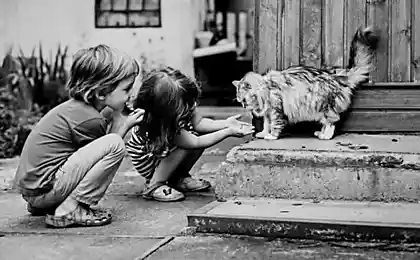682
How to teach children about conscious consumption
13 tips that will help the child not to run for brands to think about their desires
Only when your daughter asks for a prom Birkin bag cost of your monthly salary, you suddenly remember that they forgot to talk to her about the consumer society, advertising promises and dopamine trap.
We live in a marvelous affluent world saturated with things, ideas and information. It's a lovely universe in which it is possible to feed any orphaned noodles, and there are plenty of opportunities for self-expression. The most valuable resources here are not become things and our time and attention.
Eighty one million one hundred sixty five thousand three hundred twenty
Children, however, harder does not want to tell you about the features of the consumer society, immersing them in the XIX century with the chips, plowing and great writers, then throwing them in front of flickering screens without a life vest.
Giant piece of information that falls on the immature child's head puts pressure on the emotions and convinces to buy something from Lollipop to lifestyle.
Of course, over time the children will understand what is what, but so far the temptations around too much, and knowledge is no. You can't let them so wasteful to treat your life and the parent savings Bank cards, we can not calmly watch as they take the promotional garbage at face value and want something fake in a different wrapper.
Once you try to eat now!
According to the statistics given in "Bill Daily", children under the age of 12 years from doing about 25 thousand commercials a year, not to mention online advertising, product placement and banners pin-up girl right under your Windows. To 8 years old kids somehow believe the whole is authentic, and only after 11 years with their heads a sneaking suspicion that, maybe, this housewife who was mad with happiness, having tasted the cookie, not quite sincerely rolls his eyes and kicks in the euphoria of the feet.
But even after the teenager guessed that a new washing powder on the ceiling is not a rainbow, it still is advertising. Anyhow, after she is made taking into account our needs, inclinations and needs — if you find it hard to resist buying a new washing machine, what is the child?
Marketers cleverly laid out the bait cause a release of the neurotransmitter dopamine. Dopamine promises brain reward, causes us to look forward to happiness. By itself, it does not make anyone happy, only stimulates to be more alert, to concentrate and at whatever the cost to get something that promises pleasure. Dopamine need evolution to man, taking a spear, search for the elusive antelope, anticipating the evening with his wife and kebab in front of a fire. Today, our dopamine system works too fiercely: for the good of the economy and civilization, we should want all the latest models — the previous version of antelope is already out of fashion.
And if adults can experience this moment as something to reflect on, the children obediently rush for the promise of a reward, taking it a promise for happiness.
The focus of dopamine in the fact that he will never say:"OK, now enough". The race should be infinite.
Why do children stop playing? Why are they stockpiling so coveted toys in the closet, instantly losing interest in the pink house for a zombie the size of your hallway? The house was vybrasyvalsya, among other things, two months.
To start the game need some willpower. The house has, but happiness has not come, the dopamine is being produced by a new thing: e beaver, which by night can be revived under the parental bed. The child does not perceive that he had fallen into the trap of dopamine. And even when from under the bed ancestors pop up beaver, children's joy is incomplete. Because it has no new game consoles.
Forty three million four hundred twenty six thousand one hundred sixteen
After all, you deserve it
Another problem — the lack of time. We are making a lot of spontaneous purchases; with the advent of plastic cards and the Internet, many decisions are made on the run, without the brain. And while you've acquired a cashmere sweater (30% discount!), you forgot to explain to the child that there are real needs: to be meaningful, to be accepted, be yourself. There's something really cool — creativity, communication, research and creation. But these things that can bring real joy, once elusive are replaced by cheap substitutes: the pursuit of novelty, superficial pleasures and competition of "who has stronger keychain".
Where there is no real satisfaction of emotional needs, is a quick substitute.
About it writes the American artist and teacher Edith Kramer in his book "Art therapy with children»:
"Bribing children with material possessions now ceased to be a privilege of rich families. Mass bribery of the children seized even poor. For example, along with Breakfast, the child shoved a lot of toys and trinkets. These things are not a symbol of sympathy and baited, and the child understands why they can't give him the satisfaction. Instead, they receive feeds greed, which works into the hands of the manufacturer. Like any flattery, these handouts are based on a subtle knowledge of the needs of the child and his weaknesses. Often a substitute is almost impossible to distinguish from the real thing, so that the satisfaction of basic needs, mistrust and disappointment are inextricably linked. Today's disturbing children and teenagers of our large cities are not only deprived of love, understanding, life and gaming space, they also bribed, seduced and devastated."
Habit instantly to any nonsense that caused the dopamine surge, without effort and hesitation plays into the hands of children. They become, in the words of Kramer, "impatient and unfocused" throw any lesson as soon as it goes off the first outbreak of enthusiasm, and then read to a child "the Iliad" — is unclear.
Take everything from life
Now you will begin to argue: "Oh, some nonsense. It is necessary, that the child was a rich environment, and this is it, "LEGO death star". And such a portfolio with spikes. And sneakers with lights. That is not worse than the guys, and then it will develop an inferiority complex, and in the evening the house will drip a tear of the child, and grandma can't bear it...»
No, of course, you can curse of the consumer society, which spoils the kids, and get away from it somewhere closer to North Korea, but certainly there too, not everyone will like it.
For those who remain, there are a few psychological tips from a psychologist and teacher Irina Belyaeva, which will help to form the most healthy relationship to the world:
Nine million four hundred twenty nine thousand eight hundred ninety three
1. Great if the child is able to make a choice. It is laid with a very young age, when someone offers a choice of sliders with red pots or blue. The feeling that you are unable to solve something that you have an alternative — a fertile ground for growth. For example, the Soviet our parents ' generation didn't have to choice but choice to the end of a queue to get up. So grandma is unlikely to teach your child to navigate among the shirts Chinese manufacturing. A parent would be good not to impose your taste even a first grader: "No, son, why do you have some naked woman on his pants, to give you the top three with a tie to buy!"Let the child learns to make choices and to justify it.
2. The parent also needs to be able to say to yourself: "Stop, I don't need it!» Strangely is the person who buys the fifth helicopter in a month, a child teaches that you need 500 times to think before to buy a stick of gum. If the mother removes the stress of shopping, why we are indignant, when my daughter asks for new shoes, not skates snoep.
3. Should not offer excessive choices. Knowing that people are crazy about dinosaurs, don't need to drive it between boutique "stuff out of the skin of dinosaurs and Triceratops life size". During heavy puberty girls do not multiply sorrow in large shopping centers.
4. In the world there are other joys, but a new sofa, right? If a family decided to jump to the ceiling because svejesobranna dishes and three weeks to wash the purchase of a vacuum cleaner, the children can somehow guess that this is the real value. Strange looks, when we going to a grandmother, a friend, reading books and going to the Museum of longing and punishment, and "let's go to Megamall" is a success and the carousel. Show that there are things that do not require special costs, that the world is full of wonderful experiences, even though you're old jeans.
5. Reassuring children things. Do not make them the only option consolations, encouragements and awards. Hang out, walk, impression, conversation, and hugs — your child craves not only a hike in the "Children's world".
6. Help relive frustration. Yeah, I really want to buy you a drum set, but, unfortunately, in size it does not fit in our apartment. Too bad. Let's cry. That drum we could afford. Comfort and sympathy, and five and twenty five times, substitute the vest and shoulder. Tears of futility, as it is known, is useful.
7. Demonstrate the reflection on the theme "I wanted, here buy, and nothing happened." Look how I've dreamed of this dress, and it is already three months hanging, and even wear don't want. You can gently at this point to turn to the child, and, well, better not, that came out of the scandal.
8. Discuss sensitive issues. Why do you want this thing? Here we stand at the cash register, then the guys specially put a cute three-headed Bunny for 200 rubles. I do not mind for your smile 200 rubles, but judge for yourself: we give the money, someone is getting richer (not our family), after 20 minutes the Bunny from the new becomes old, his fate is sad, he lies gathering dust, and you feel deception. Damn dopamine!
9. View with the child is and discuss what methods are marketers,to get you to want something. Why are you afraid of the bacteria, show pictures before and after, promise the solution to all the problems of life and success with girls after buying a soda. As practice shows, children can not see much, don't read even the most simple things. And we like them raw even on the street produced?
10. Disassemble a teenager advertising slogan — even he knows that he is selling a myth. It is foolish to suggest that the myth is worth nothing, in the information society — just a myth and worth the money unlike things. But man even at the age of 10 should know what he buys: OK I'm not crying over a jacket with the face of David Bowie, and identity and myth, but even if this myth will be mine.
11. Give the child more communication. Go with him in the campaign, in a difficult journey, turning off the pre-iPad. Pay his attention to the fact that the last days he used the tablet as a shovel, and was, in General, cool.
12. Take care of the environment. If a child goes every day to school, in which the owners are not the sixth iPhones get in the back of a crinkled paper, it is unlikely to penetrate your talking about the despised material things. The children are not fully formed emotional and cognitive integration, it is difficult to hold onto when the environment pressure.
Also interesting: 77% of Teens can't imagine life without a smartphone, even in summer
Attention! This toy can make the baby sick!
13. Once more: talk with the children, create awareness. Why do you want this thing? You were just passing by and wanted? Or everything around it is already bought? How many things need to be special? And to be yourself? How many things in the wardrobe of successful people? And what is your personal touch?
Author: Inna Appliance
P. S. And remember, only by changing their consumption — together we change the world! ©
Source: www.facebook.com/Sattvamama/posts/1758945784346827:0
Only when your daughter asks for a prom Birkin bag cost of your monthly salary, you suddenly remember that they forgot to talk to her about the consumer society, advertising promises and dopamine trap.
We live in a marvelous affluent world saturated with things, ideas and information. It's a lovely universe in which it is possible to feed any orphaned noodles, and there are plenty of opportunities for self-expression. The most valuable resources here are not become things and our time and attention.
Eighty one million one hundred sixty five thousand three hundred twenty
Children, however, harder does not want to tell you about the features of the consumer society, immersing them in the XIX century with the chips, plowing and great writers, then throwing them in front of flickering screens without a life vest.
Giant piece of information that falls on the immature child's head puts pressure on the emotions and convinces to buy something from Lollipop to lifestyle.
Of course, over time the children will understand what is what, but so far the temptations around too much, and knowledge is no. You can't let them so wasteful to treat your life and the parent savings Bank cards, we can not calmly watch as they take the promotional garbage at face value and want something fake in a different wrapper.
Once you try to eat now!
According to the statistics given in "Bill Daily", children under the age of 12 years from doing about 25 thousand commercials a year, not to mention online advertising, product placement and banners pin-up girl right under your Windows. To 8 years old kids somehow believe the whole is authentic, and only after 11 years with their heads a sneaking suspicion that, maybe, this housewife who was mad with happiness, having tasted the cookie, not quite sincerely rolls his eyes and kicks in the euphoria of the feet.
But even after the teenager guessed that a new washing powder on the ceiling is not a rainbow, it still is advertising. Anyhow, after she is made taking into account our needs, inclinations and needs — if you find it hard to resist buying a new washing machine, what is the child?
Marketers cleverly laid out the bait cause a release of the neurotransmitter dopamine. Dopamine promises brain reward, causes us to look forward to happiness. By itself, it does not make anyone happy, only stimulates to be more alert, to concentrate and at whatever the cost to get something that promises pleasure. Dopamine need evolution to man, taking a spear, search for the elusive antelope, anticipating the evening with his wife and kebab in front of a fire. Today, our dopamine system works too fiercely: for the good of the economy and civilization, we should want all the latest models — the previous version of antelope is already out of fashion.
And if adults can experience this moment as something to reflect on, the children obediently rush for the promise of a reward, taking it a promise for happiness.
The focus of dopamine in the fact that he will never say:"OK, now enough". The race should be infinite.
Why do children stop playing? Why are they stockpiling so coveted toys in the closet, instantly losing interest in the pink house for a zombie the size of your hallway? The house was vybrasyvalsya, among other things, two months.
To start the game need some willpower. The house has, but happiness has not come, the dopamine is being produced by a new thing: e beaver, which by night can be revived under the parental bed. The child does not perceive that he had fallen into the trap of dopamine. And even when from under the bed ancestors pop up beaver, children's joy is incomplete. Because it has no new game consoles.
Forty three million four hundred twenty six thousand one hundred sixteen
After all, you deserve it
Another problem — the lack of time. We are making a lot of spontaneous purchases; with the advent of plastic cards and the Internet, many decisions are made on the run, without the brain. And while you've acquired a cashmere sweater (30% discount!), you forgot to explain to the child that there are real needs: to be meaningful, to be accepted, be yourself. There's something really cool — creativity, communication, research and creation. But these things that can bring real joy, once elusive are replaced by cheap substitutes: the pursuit of novelty, superficial pleasures and competition of "who has stronger keychain".
Where there is no real satisfaction of emotional needs, is a quick substitute.
About it writes the American artist and teacher Edith Kramer in his book "Art therapy with children»:
"Bribing children with material possessions now ceased to be a privilege of rich families. Mass bribery of the children seized even poor. For example, along with Breakfast, the child shoved a lot of toys and trinkets. These things are not a symbol of sympathy and baited, and the child understands why they can't give him the satisfaction. Instead, they receive feeds greed, which works into the hands of the manufacturer. Like any flattery, these handouts are based on a subtle knowledge of the needs of the child and his weaknesses. Often a substitute is almost impossible to distinguish from the real thing, so that the satisfaction of basic needs, mistrust and disappointment are inextricably linked. Today's disturbing children and teenagers of our large cities are not only deprived of love, understanding, life and gaming space, they also bribed, seduced and devastated."
Habit instantly to any nonsense that caused the dopamine surge, without effort and hesitation plays into the hands of children. They become, in the words of Kramer, "impatient and unfocused" throw any lesson as soon as it goes off the first outbreak of enthusiasm, and then read to a child "the Iliad" — is unclear.
Take everything from life
Now you will begin to argue: "Oh, some nonsense. It is necessary, that the child was a rich environment, and this is it, "LEGO death star". And such a portfolio with spikes. And sneakers with lights. That is not worse than the guys, and then it will develop an inferiority complex, and in the evening the house will drip a tear of the child, and grandma can't bear it...»
No, of course, you can curse of the consumer society, which spoils the kids, and get away from it somewhere closer to North Korea, but certainly there too, not everyone will like it.
For those who remain, there are a few psychological tips from a psychologist and teacher Irina Belyaeva, which will help to form the most healthy relationship to the world:
Nine million four hundred twenty nine thousand eight hundred ninety three
1. Great if the child is able to make a choice. It is laid with a very young age, when someone offers a choice of sliders with red pots or blue. The feeling that you are unable to solve something that you have an alternative — a fertile ground for growth. For example, the Soviet our parents ' generation didn't have to choice but choice to the end of a queue to get up. So grandma is unlikely to teach your child to navigate among the shirts Chinese manufacturing. A parent would be good not to impose your taste even a first grader: "No, son, why do you have some naked woman on his pants, to give you the top three with a tie to buy!"Let the child learns to make choices and to justify it.
2. The parent also needs to be able to say to yourself: "Stop, I don't need it!» Strangely is the person who buys the fifth helicopter in a month, a child teaches that you need 500 times to think before to buy a stick of gum. If the mother removes the stress of shopping, why we are indignant, when my daughter asks for new shoes, not skates snoep.
3. Should not offer excessive choices. Knowing that people are crazy about dinosaurs, don't need to drive it between boutique "stuff out of the skin of dinosaurs and Triceratops life size". During heavy puberty girls do not multiply sorrow in large shopping centers.
4. In the world there are other joys, but a new sofa, right? If a family decided to jump to the ceiling because svejesobranna dishes and three weeks to wash the purchase of a vacuum cleaner, the children can somehow guess that this is the real value. Strange looks, when we going to a grandmother, a friend, reading books and going to the Museum of longing and punishment, and "let's go to Megamall" is a success and the carousel. Show that there are things that do not require special costs, that the world is full of wonderful experiences, even though you're old jeans.
5. Reassuring children things. Do not make them the only option consolations, encouragements and awards. Hang out, walk, impression, conversation, and hugs — your child craves not only a hike in the "Children's world".
6. Help relive frustration. Yeah, I really want to buy you a drum set, but, unfortunately, in size it does not fit in our apartment. Too bad. Let's cry. That drum we could afford. Comfort and sympathy, and five and twenty five times, substitute the vest and shoulder. Tears of futility, as it is known, is useful.
7. Demonstrate the reflection on the theme "I wanted, here buy, and nothing happened." Look how I've dreamed of this dress, and it is already three months hanging, and even wear don't want. You can gently at this point to turn to the child, and, well, better not, that came out of the scandal.
8. Discuss sensitive issues. Why do you want this thing? Here we stand at the cash register, then the guys specially put a cute three-headed Bunny for 200 rubles. I do not mind for your smile 200 rubles, but judge for yourself: we give the money, someone is getting richer (not our family), after 20 minutes the Bunny from the new becomes old, his fate is sad, he lies gathering dust, and you feel deception. Damn dopamine!
9. View with the child is and discuss what methods are marketers,to get you to want something. Why are you afraid of the bacteria, show pictures before and after, promise the solution to all the problems of life and success with girls after buying a soda. As practice shows, children can not see much, don't read even the most simple things. And we like them raw even on the street produced?
10. Disassemble a teenager advertising slogan — even he knows that he is selling a myth. It is foolish to suggest that the myth is worth nothing, in the information society — just a myth and worth the money unlike things. But man even at the age of 10 should know what he buys: OK I'm not crying over a jacket with the face of David Bowie, and identity and myth, but even if this myth will be mine.
11. Give the child more communication. Go with him in the campaign, in a difficult journey, turning off the pre-iPad. Pay his attention to the fact that the last days he used the tablet as a shovel, and was, in General, cool.
12. Take care of the environment. If a child goes every day to school, in which the owners are not the sixth iPhones get in the back of a crinkled paper, it is unlikely to penetrate your talking about the despised material things. The children are not fully formed emotional and cognitive integration, it is difficult to hold onto when the environment pressure.
Also interesting: 77% of Teens can't imagine life without a smartphone, even in summer
Attention! This toy can make the baby sick!
13. Once more: talk with the children, create awareness. Why do you want this thing? You were just passing by and wanted? Or everything around it is already bought? How many things need to be special? And to be yourself? How many things in the wardrobe of successful people? And what is your personal touch?
Author: Inna Appliance
P. S. And remember, only by changing their consumption — together we change the world! ©
Source: www.facebook.com/Sattvamama/posts/1758945784346827:0























